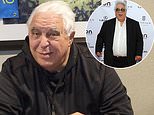Consumer groups ask FTC to probe 'deceptive and misleading' Tesla Autopilot ads
- The Center for Auto Safety and Consumer Watchdog have complained
- Say consumers could be misled into thinking Autopilot makes a Tesla self-driving
Two U.S. consumer advocacy groups urged the Federal Trade Commission on Wednesday to investigate what they called Tesla Inc's 'deceptive and misleading' use of the name Autopilot for its assisted-driving technology.
The Center for Auto Safety and Consumer Watchdog, both non-profit groups, sent a letter to the FTC saying that consumers could be misled into thinking, based on Tesla's marketing and advertising, that Autopilot makes a Tesla vehicle self-driving.
Autopilot, released in 2015, is an enhanced cruise-control system that partially automates steering and braking.
Scroll down for video

Tesla-CEO Elon Musk speaks during the delivery of the first more reasonable Tesla vehicle Model 3 in Fremont. Two U.S. consumer advocacy groups urged the FTC to investigate what they called Tesla's 'deceptive and misleading' use of the name Autopilot for its assisted-driving technology.
Tesla states in its owner's manual and in disclaimers that when the system is engaged, a driver must keep hands on the wheel at all times while using Autopilot.
But in the letter, the groups said that a series of ads and press releases from Tesla as well as statements by the company's chief executive, Elon Musk, 'mislead and deceive customers into believing that Autopilot is safer and more capable than it is known to be.'
'Tesla is the only automaker to market its Level 2 vehicles as 'self-driving', and the name of its driver assistance suite of features, Autopilot, connotes full autonomy,' the letter read.
'The burden now falls on the FTC to investigate Tesla's unfair and deceptive practices so that consumers have accurate information, understand the limitations of Autopilot, and conduct themselves appropriately and safely,' it read.
Tesla was not immediately available for comment.
Two U.S. Tesla drivers have died in crashes in which Autopilot was engaged.
The most recent crash, in March, is being investigated by safety regulators.
Tesla has said the use of Autopilot results in 40 percent fewer crashes, a claim the U.S. National Highway Traffic Safety Administration repeated in a 2017 report on the first fatality, which occurred in May 2016.
Earlier this month, however, the agency said regulators had not assessed the effectiveness of the technology.
Last month, another group, Consumers Union, the advocacy division of Consumer Reports, called on Tesla to improve the safety of its Autopilot system.
Most watched News videos
- Scottish woman has temper tantrum at Nashville airport
- Tesla Cybertruck explodes in front of Trump hotel in Las Vegas
- Mass panic as New Orleans attacker flies down Bourbon street
- Shocking moment zookeeper is fatally mauled by lions in private zoo
- Horrific video shows aftermath of New Orleans truck 'attack'
- Meghan Markle celebrates new year in first Instagram video
- Tesla Cybertruck burns outside Trump hotel in Las Vegas
- See how truck that drove into crowd made it through police barrier
- Cheerful Melania Trump bops to YMCA at Mar-a-Lago NYE bash
- New Orleans terror attack suspect reveals background in video
- Plane passenger throws drink at flight attendant in boozy fight
- Horrifying moment yacht crashes into rocks and sinks off Mexico coast























































































































































































































































